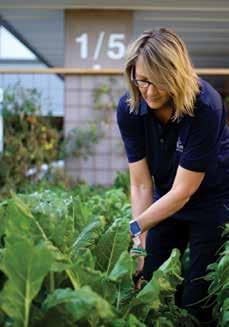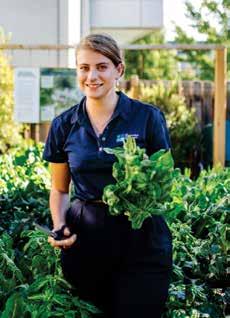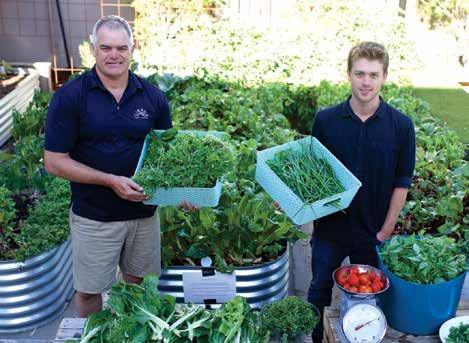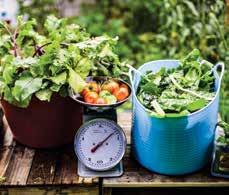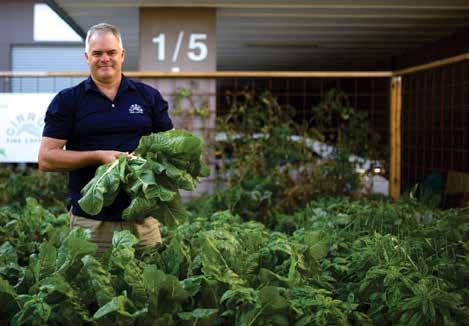
4 minute read
TURNING CITY SPACES INTO URBAN FARMS TO FEED A HUNGRY CITY
Can two inner city car parks produce enough fruit and vegetable to feed two adults for an entire year? It’s a concept that is explored by Biofilta Director, Brendan Condon.
In the November of 2018, staff at Cirrus Fine Coffee in Port Melbourne agreed to give up three car parking spaces at their Port Melbourne Roastery and build a pop-up urban farm directly on top. Their intention was to turn the organic by-products of the coffee roasting process (coffee chaff and grounds), into a valueadding input for their very own vegetable garden. Sustainability is at the heart of Cirrus’ values and diverting their waste streams is one of many initiatives they are undertaking to minimise their impact on the environment.
The Sustainable Landscape Company (TSLC) designed and constructed the space, allocating two of the car spaces for food production and the other as an outdoor staff meeting area/lunch spot. TSLC used recycled pallets for seating and plantation timber with recycled rebar for trellising and to articulate the space. TSLC collaborated with Biofilta, an urban farming company who designed and manufactured the modular wicking gardens beds used in the pop-up farm. The wicking beds are designed specifically for urban environments and for people with little gardening experience. They are easy to use, water efficient, low maintenance and pump out enormous amounts of fresh produce.
The space was used by Biofilta to conduct research on how much food could be grown in one car space, in one year, using their innovative wicking garden beds. According to the World Health Organisation (WHO), a healthy adult human should eat 400 grams of fruit and vegetable each day. That equates to 150kgs each year. That then became the goal - to produce 150kgs of fruits and vegetables in each car park within the year. Which is 300kgs in total for both car spaces. The wicking beds smashed this target. Between November 2018 and November 2019, the pop-up farm produced over 460kgs of food, enough to feed three healthy adults and valued at over $5000 based on major supermarket prices.
These numbers are not only a huge endorsement for Biofilta’s wicking beds, but they also answer a broader question concerning the viability of urban food production. There are car parks, vacant lots, industrial spaces and rooftops throughout our cities, not to mention backyards, that represent huge potential for cities to grow more of their own food. Biofilta is on a mission to transform these under-utilised urban spaces into thriving urban farms.
Eily, one of two staff members in charge of the pop-up farm thinks that this isn’t far away.
“The beauty of a garden like this is that it is perfect for the modern world. I come to work, check on my babies, watch them grow, harvest every now and again and do a reset a couple of times a year. I water less than once a week, there are almost no weeds and I can come back from a hot and dry weekend knowing that they’ll still be happy and healthy.”
But urban farming is not just about growing food. Biofilta Director, Brendan Condon, acknowledges that urban farming will never supplant broad acre agriculture, nor should it. However, there are many functions that urban farms can serve beyond the local production of fresh fruits and vegetables. Urban farms have the potential to increase biodiversity in cities, improve mental and physical health, close resource loops and improve environmental literacy amongst cities dwellers.
24 Urban farms can also feed disadvantaged segments of our community. While some of the food from Cirrus’ pop-up farm is taken home by staff, they donated all the excess to OzHarvest, a food charity that collects food and distributes it to where it’s needed. Partnerships like these could improve access to healthy and nutritious food for the most vulnerable. “The Sustainable Landscape Company and Biofilta are working together to build pop up farms in schools, rooftops, backyards and public spaces, to help feed hungry cities. Biofilta is also happy to work directly with any landscaper or designer across Australia to supply their easy to install wicking beds and help build efficient food gardens and urban farms.”
For Ben, another gardener at the pop-up farm, it couldn’t be simpler.
Clockwise from top left: Brendan Condon with a handful of the bountiful produce from the pop up farm; Great opportunities for staff to take a bit of time out in the garden; Over 400 kilograms of fresh produce has been grown in one year from 2 car spaces; The Biofilta foodcubes clad in different finishes; Each harvest was weighed and compared to supermarket prices.; Eily Schultz taking part in one of the harvest days at the pop up farm.
